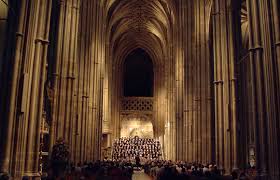Hanover Band, Richard Cooke
Canterbury Cathedral, 12 March 2016
It is always a treat to hear Messiah and, personally I never tire of it – from the crisp rhythms of the Overture to that wonderful top A from the sopranos, nine bars before the end, which somehow encapsulates the wonder of the whole piece. And this performance pushed most of the buttons.
It’s slightly incongruous to hear it sung by big forces accompanied by the original instruments of the Hanover Band. It’s arguably a contradiction. Nonetheless it’s a pleasure to hear those slender 18th century trombones, positioned next to the altos for Glory to God. The enjoyable clean, dry sound of the old timpani is quite different from the rumbling resonance of their modern descendants. And of course the trumpet, slightly understated in this performance and quieter than a 21st century one, dramatically underpins The Trumpet Shall Sound.
Visually, Canterbury is probably the most iconically atmospheric building in the country. But it isn’t a concert hall. Even with the huge and very competent Canterbury Choral Society on a steeply tiered seating west of the rood screen there is still an acoustic problem. Tenor, Jamie MacDougall began Comfort Ye carefully under tempo but it was still fuzzy even from row F where I was sitting.
The lofty acoustic seems to be kinder to higher registers than lower ones. Alexander Chance, counter-tenor, gave a very sensitive, performance with total clarity and perfect diction especially in the 6/8 lilt of O thou that tellest glad tidings to Sion and in his searingly moving I Know That My Redeemer Liveth. Chance, the son of counter-tenor Michael Chance, is a recent graduate from New College College Oxford where he was a choral scholar so he’s still very young. I’m sure we shall hear more of him. There was also elegant work from soprano Jessica Leary who sings with a smile in her voice.
Rather disappointing, however, was bass Barnaby Rea. Apart from acoustically caused vocal muddiness, his intonation was sometimes doubtful. He seemed, moreover, to be reading every note from his copy as if rehearsing an unfamiliar work, so there was very little audience eye contact.
The choir, however, like the orchestra, does an excellent job. A member of Canterbury Choral Society told me recently that they have to sing crowd-pleasing Messiah more often than some members would like and that other good, but less popular works get fewer outings. Well, I understand her frustration but it works in the choir’s favour too. Because they clearly know Messiah so well they sing it with terrific confidence, panache with plenty of very professional focus on the conductor. There’s none of that heads-buried-in-copies which bedevils so many amateur choirs. And that enables Richard Cooke to coax an exceptionally coherent sound from them.
I’m now looking forward to CCS’s Verdi Requiem with Royal Philharmonic Orchestra in June.

